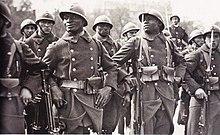
Folkert Jensma beschrijft de rechtsstaat (NRC 18/11/24 Wat komt er na het noodrechtdebacle?) als een stuwdam die op het punt staat te bezwijken. Dat is veel te overdreven. Dat de rechters als beroepsgroep zich beraden over de effecten van het democratisch gekozen landsbestuur is niet verwonderlijk, gezien de golf van verrechtsing van de politiek in binnen én buitenland. En het is maar goed, dat zij daarin hun positie kiezen. Een positie, die niets anders is dan het bestendigen van wat zij altijd doen: rechtspreken aan de hand van de wet, rekening houdend met individuele omstandigheden, de menselijke maat.
De vergelijking met de donkere dagen voor de rechtspraak in de oorlogsjaren gaat op een zeer belangrijk punt mank: er is nu geen pistool van een bezettende macht gericht op het hoofd van de rechter. In theorie zou een zelfde situatie gecreëerd kunnen worden, als het Nederlandse leger, die opereert onder volledige ministeriële verantwoordelijkheid (art 97, lid 2 Grondwet), bedoeld als een instrument van de democratische rechtsstaat, in handen komt van een regering, die erop uit is om de trias politica van tafel te vegen door inzet van datzelfde leger. Maar je zal geen generaal, kapitein of sergeant kunnen vinden die zich daarvoor leent. Sterker, zij zullen om de rechters gaan staan en deze met hun eigen leven beschermen. Rechters in NL kunnen hun uitspraak zonder last of ruggespraak blijven doen.
Folkert Jensma describes the rule of law (NRC 18/11/24 What comes after the emergency law debacle?) as a dam that is about to collapse. That’s way too exaggerated. It is not surprising that judges as a professional group consider the effects of the democratically elected government, given the wave of right-wing politics at home and abroad. And it is a good thing that they choose their position in this. A position that is nothing other than the perpetuation of what they always do: administering justice according to the law, taking into account individual circumstances and the human dimension.
The comparison with the dark days for the judiciary during the war years is flawed on a very important point: there is now no gun from an occupying power aimed at the judge’s head. In theory, the same situation could be created if the Dutch army, which operates under full ministerial responsibility (Article 97, paragraph 2 of the Constitution), intended as an instrument of the democratic constitutional state, falls into the hands of a government that aims to wipe out the trias politica by deploying the same army. But you won’t be able to find a general, captain or sergeant who lends himself to that. In fact, they will surround the judges and protect them with their own lives. Judges in the Netherlands can continue to make their rulings without any burden or consultation.
Ricky Turpijn



